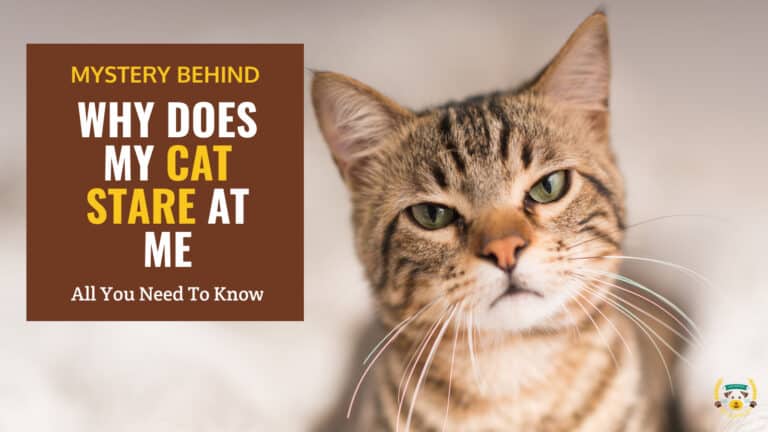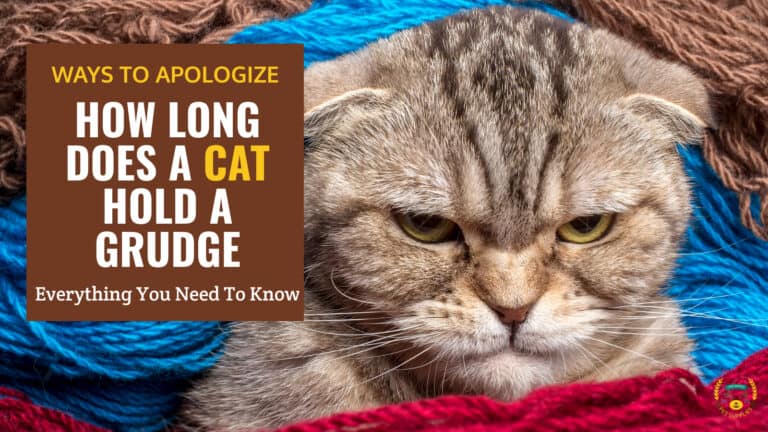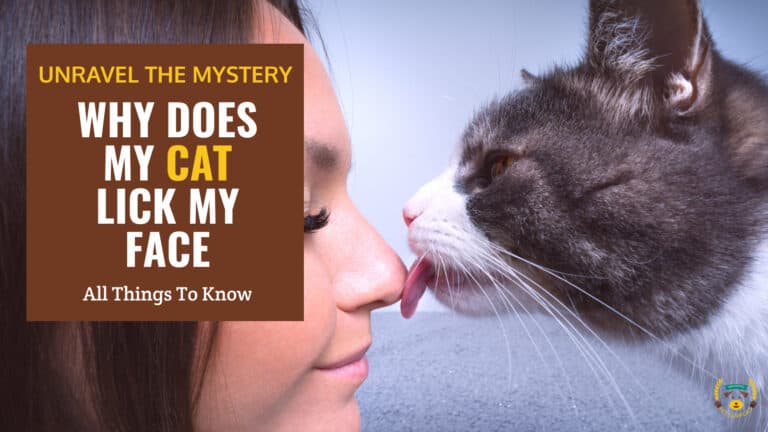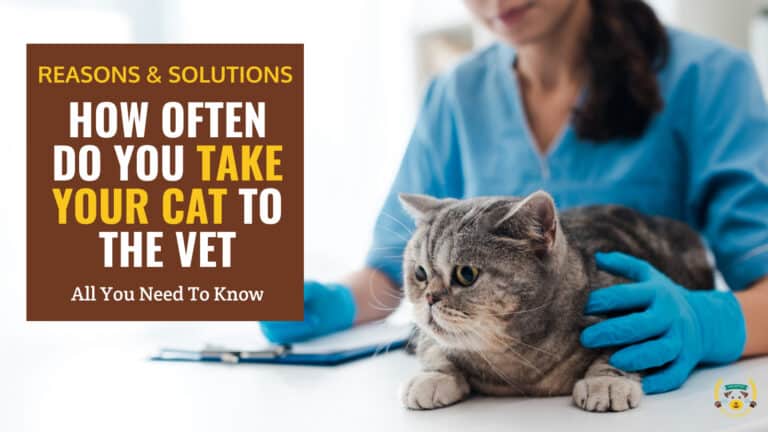An Ultimate Beginner Guide To Getting Your First Cat
Last updated: June 24, 2025

Summary
- Consider commitment, costs, time, health issues, and pet-friendly home before getting a cat. Cats can live 15-20 years.
- Research cat breeds based on shedding, size, energy, temperament to find the best suited for your home. Purebred vs mixed breeds.
- Adopting can save money and help shelter cats vs buying from breeders. Consider adult cat vs kitten based on needs.
- Indoor cats live longer but outdoor cats are more active. Create indoor enrichment.
- Essential supplies include ID tag, bowls, quality food, carrier, odor neutralizer, non-toxic cleaners, nail clipper, collar, toys, brush.
- Provide proper nutrition and feeding schedules based on age and food types. Groom regularly. Vet checkups and vaccines are critical.
- Start training cats young through positive reinforcement. Litter box train. Provide appropriate scratching posts.
- Understand normal cat behaviors like excessive sleeping, biting, lifespan, eating grass.
- Feed cats 1-2 times daily based on factors like age.
- Commit to a cat's long lifespan and required care to have a happy healthy cat and home.
Are you ready to bring a soft, purring, and cute companion at home? Have you already started to shortlist the cat breed you want? Are you planning for some intrinsic and attractive décor that will make your cat feel at home? Before you get more excited about bringing a cat home, potential cat owners need to have some basic learning about their behavioral patterns, instincts, feeding habits, etc.
Should I Get a Cat?, Definitely Yes!.. Cats are one of the most excellent companions humans can have. They are attractive, easy to cuddle, intelligent, and can be your loyal friend. Hence, bringing this feline friend is a significant decision to ponder upon. Although cats have received an acclamation of being more independent amongst the canine species, cats will still require a great deal of energy, time, and money for their maintenance. So, before you go to the nearest pet store and bring home a cute kitty, here is some basic guidance for beginners.
Whether you are a cat, dogs, fish, birds, or reptiles enthusiast, we cover it all, make sure to keep an eye on Pet Supplies Unlimited to get more information and in-depth Pet Supplies Reviews.
- 1) What should you consider before getting a cat?
- 2) Selecting a Cat Breed
- 3) Adopting VS. Buying a cat
- 4) Should I Get a Cat (Adult) or a Kitten?
- 5) Indoor or Outdoor cat
- 6) Supplies shopping list for a New Cat
- 7) Basic Cat Care
- 8) Grooming
- 9) Your cat health
- 10) Training & behavior
- 11) Frequently Asked Questions
- 12) Why do cats sleep so much?
- 13) Why does my cat bite me?
- 14) How long does a cat live?
- 15) Why do cats eat grass?
- 16) How to travel with a cat?
- 17) How often should I feed my cat?
- 18) Conclusion
What should you consider before getting a cat?

If you think it is the 'purrfect' time to bring home your feline friend, the cat owners must do due diligence on cats. Owners need to ponder on the long commitment and financial aspect that concerns the well-being of the cats. While some may want a cat to cuddle as they sit on their laps, others may like an independent cat who is not much involved with human interaction.
Every cat has an inherent personality trait that either makes them confident or intimidates them while socializing with humans. So, before planning to adopt a cat, you should do research on the breed you want to adopt, learn more about cat care, accessories, and make a home cat friendly place.
Do I have time for a cat?
Cats are one of the best companions for humans, especially children. So before getting one, you should ask yourself these questions:
- Cats can live up to 15-20 years, which means a long-term commitment. Are you ready for this kind of long-term commitment?
- Kittens require adequate attention for the first 12 months. Would you be able to spare a few hours a day for your most loved pet?
- Cat care mainly involves playing, feeding, grooming, and lots of love and attention. Are your family members ready for this new addition?
- Although you can train your cat to walk on the leash, going out for daily exercise helps improve their mental and physical health. Do you have much free time on hand?
How much should I expect to spend?
The new purr member of your family can cost you nearly $400 a year with maintenance, grooming, feeding, adoption, and medical expenses.
- The sum can increase under unforeseen circumstances and emergencies. Most of its expenses are spent on vet checkups, adoption, purchasing cat toys, high-quality food, cat beds, carriers, litter boxes, etc.
- Besides, additional costs can include pet sitting or boarding fees when the owner decides to have an extended vacation.
- Cats also require professional grooming to maintain that silky shine fur on their body, having a low maintenance cat can curb this expense.
- The owners should also consider an emergency veterinary cost as it can go up to a few hundred dollars.
So, it is recommended that save on the luxuries of having a fancy cat collar, use simple cat bowls for food, have a manual litter box, and opt for nutritious yet low-budget cat food.
Do I have any health problems that may prevent me from having a cat?
The most common health peril that can prevent you from bringing home your feline friend is allergy. As a cat owner, if you are prone to having pet allergies, this purr animal may aggravate your perils.
Cats have allergies to their skins and fur, so having too many of them at home can make your house an allergic-prone zone. But the allergen gets on their coat from a protein named Fel D1 found in the Cat saliva, which dries up and becomes airborne, thereby making the owner prone to cat allergy.
So, can you live with a cat if you are allergic? Yes, and so we recommend you to bring home a low fur cat that can be easily groomed and kept clean.
Is my living space cat-friendly?
It is imperative to make the living space as comfy as possible if you plan to bring home a cute purr animal. Cats have a curious mind and tend to explore their surroundings.
- Make adequate space for exploration: Cats tend to hang out in high places, such as window perches, cat trees, tables, shelves, and homemade forts to leverage their natural hunting instinct.
- Remove the clutter: An open space devoid of too many clutters helps the cat to lounge and play. They will also love to see nature and chirping birds from the windows, so windows must have a more unobstructed view.
- Eliminate harmful objects: It is imperative to remove harmful objects, such as toxic home plants, chemicals, cleaning supplies, sharp equipment, and candles, which can pose a threat to your feline friend.
- Be attentive to their needs: Cats are hygienic animals, so cleaning them is a must. Besides, to make the ambiance comfortable, give them a cat bed with a soft blanket to sleep, a cat tree to sharpen their claws, and a litter box.
- Keep them entertained: Indulge in interactive games with your feline friend to keep them entertained and make the living space comfortable.
Are there any other pets?

As a pet owner, you cannot force your pets to like each other, but you can try to socialize with them by interacting and playing. If you have other pets in the house, adopt a cat who is active and sociable like your existing pet.
Bringing home, a mature cat that has not come in contact with other animals can make it difficult for them to share space. Start with a slow introduction by placing their food dishes close by and giving them toys to share and play. This will prevent any aggressive behaviors among your pets, and they will slowly become accustomed to each other's presence.
For animals, smell plays a pivotal role than appearance, so to make your feline friend adjusted to other pets make them get used to each. Take a slow and steady introductory approach, avoid conflicts, and help all your pets feel at home.
Selecting a Cat Breed
A cat is a bundle of joy that brings in emotional, mental, and physical happiness to the owner. So what pet should I get as there are various types of cats, each having their charm?
Cats vary according to a personality trait, shedding, size, temperament, pure breed or mixed breed, etc. Besides, activity level and finance also play a pivotal factor in selecting the cat breed.
So, before you visit a pet store and bring home your feline friend, there are certain selection factors to ponder. Let's have a look!
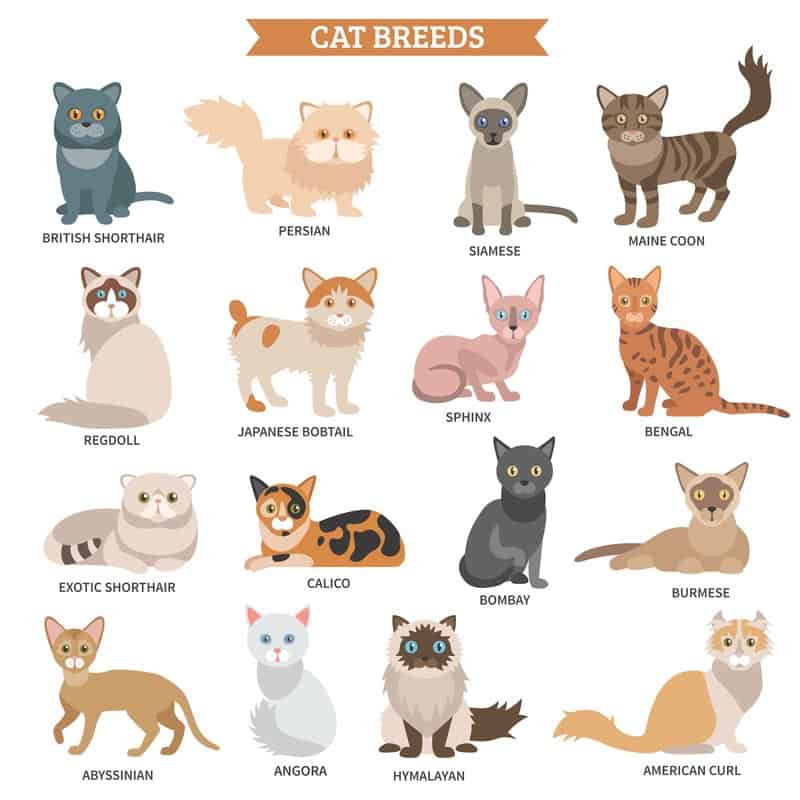
What you need to know about cat breeds?
Cat breeds are classified into the following genres.
- Hypoallergenic Cats: Should I get a cat? —a common question asked by every cat allergic person. But you can adopt a cat, preferably the hypoallergenic breed like Balinese, oriental shorthair, Javanese, Siberian, Devon Rex, and Sphynx.
- Hairless Cats: Planning to get a low maintenance cat, check out the hairless cat breeds like Sphynx, Peterbald, Donskoy, Minskin, and Elf Cat.
- White Cats: Pure white cats comprise 5% of the total cat population. You can get home one of these furballs, preferably an American Curl, British Shorthair, Japanese Bobtail, Persian, Scottish Fold, or Siberian.
- Fluffy Cats: Fluffy cats are the best cats’ breeds that suit your family. These cats win the heart with their impressive personality. Some of these are Maine Coon, Munchkin, Persian, Ragdoll, Himalayan, etc.
- Large domesticated Cats: If you want to adopt a large cat, try for Siberian Cat, Ragamuffin, Turkish Van, Maine Coon, or Bengal cat breed. If you are interested in Bengal cats specifically, be sure to research the costs involved before deciding, as their unique coat patterns and exotic pedigree can demand higher purchase prices than some other breeds.
Best Cat Breeds: Factors to Consider
Felines reeds are broadly classified but will fall in any one of the four categories—mixed breed, semi-foreigner, orientals, and natural breed. Here are some factors that would help you decide that best-suited cat breed for your home.
- Commitment level: Cats have a prolonged life span of 10-20 years so that owners can bring home cats having a longer life span for a full-time commitment.
- Family Age: Your family age is a deciding factor before adopting a cat. Children and toddlers can harm the cat and vice-versa. So, bring a cat who is easy to domesticate and friendly with kids.
- Attitude: Cats have multifarious personality traits and can be shy, mature, or independent. But we recommend an interactive cat for fun-filled entertainment at home.
Other factors to consider before deciding on the best cat breed include age and appearance because an active fluffy ball of fur is most likely to entice kids. Besides, it is imperative to decide on gender and healthcare.
Adopting VS. Buying a cat
Adopt a cat or buy a cat—a brainstorming question that might be bothering you. If it suits your budget, you can easily buy a cat that is best suited to your preference, but we recommend that you adopt one.
- With an endless number of homeless cats being euthanized in shelter homes, adopting one or more can give you a gratification of offering food and shelter to these pets.
- Adopting a cat from a shelter home will render your ample choice to select from a vast array of medically treated, hygienic cat breeds of varying age groups having various personality traits.
- Adopted cats are as loving, caring, intelligent and loyal as purchased ones
- It is cost-effective and will not impose a financial strain of buying a cat. Adopted cats range from a few hundred dollars and are well-vaccinated so that you can save the initial costs of vaccination.
Should I Get a Cat (Adult) or a Kitten?
Although most household plan on adopting a kitten, adult cats can be beneficial too
- Adult cats are available in varied size, age, appearance and temperament
- They are habituated with litter box training and are quieter than the kittens
- The behavioral pattern and character traits of adult cats are visible to the pet owners, so you know how to tame your feline friend.
- If you have kids at home, a kitten can become their playmate.
- If you prefer an active cat at home, a small kitten can make the home ambiance fun-filled and entertaining,
- While purchasing or adopting, you can get to know their medical history.
- A small kitten can adjust easily with your family members and share space with other pets in the house.
Now that you have decided to get home, a purr member thinks about whether an adult cat suits your needs, or would you prefer a little kitten entice you!
Indoor or Outdoor cat
The environment given to the cats to explore and reinvigorate their instincts plays a pivotal part in selecting whether to buy an indoor or outdoor cat breed.
- Indoor cats are homely pets and don't get into an altercation with other animals or have the danger of being hit by a vehicle.
- They have fewer chances of incurring illnesses such as Feline Leukemia Virus (FeLV) and Feline Immunodeficiency Virus (FIV).
- The outside environment helps outdoor cats to become more active, get adequate training, and promote mental health.
However, health perils such as getting infected with parasites can cause significant health issues with outside cats. Instead of entering this perplexing situation, you can create an outdoor environment for your purr member in your home by indulging in interactive hunting and hiding games, toys, and perches. It is seen that adequate human interaction and proper nutrition will make your kitty active and playful without risking health perils of the outside environment.
Check Also: Best Cat Food For Indoor Cats
Supplies shopping list for a New Cat

Before bringing home your little bundle of joy, it is imperative to have all the adequate supplies to suit your purring friend's needs. As a cat owner, you firstly need to make your home ambiance cat-friendly, get adequate cat toys, food supplies, litter boxes, and, most importantly, have to spend more time playing and interacting with this newest family member. Also, it is necessary to do due diligence about cat health and get the right vet.
Related: Best Cat Litter for Multiple Cats
ID tag with your phone number
An ID tag with the contact details of the owner on the cat is an absolute necessity. The ID will comprise the name of the owner, name of your cat, and phone number. This is necessary because if your cat gets lost, others can quickly contact you and return your feline friend to his/her home.
Identification of cats is important as without any identity, the pets may have to spend the rest of their lives in a shelter home. So, once you decide to bring home a purr friend, get it registered, and place an ID tag so that it's identifiable.
Besides ID tags, you can also place microchips underneath your cat's skin that will have a unique identification number, so that you can track your missing pets. In your cat's ID tag, you can also add information like whether it's an indoor cat. Get a customized ID tag to enhance the look of your kitty.
Food and water bowls
Cats are one of the most hygienic animals, so while serving them food and water, it is necessary to use clean bowls. Every cat in your house must have separate bowls, preferably made of stainless steel or ceramic. Although you can feed your cat in any desired bowl from your kitchen, cats will eat and sip water from their dish better.
It is highly recommended to avoid plastic bowls usage as cats can scratch soft plastic, thereby making it a hub for the bacteria to reside and develop chin rashes on your feline friend.
While using a ceramic bowl, pay special attention that its glaze is lead-free. It is also important to wash the dishes every day to maintain the cat's hygiene. If you are going on a vacation, you can also use automatic food and water servers to feed the cat in your absence.
Check Also: How Long Can a Cat Go without Water?
Food (canned and/or dry)
While planning to bring home a fluffy-haired cat at home, it is necessary to talk to a vet regarding its daily diet of canned, dry, or wet food. The type of food varies according to a cat's age.
Adult cats often have dry food all the time, while kittens can occasionally be fed a spoonful of canned food to increase their appetite. Until the kitten reaches the age of 1 year, they must be fed high-quality kitten formula dry food. If your cats refuse to eat, then you can switch to offering them baby food or warm wet food with a small amount of kitten milk replacement on the top.
Check Also: Best Vet-Approved Foods to Hide Cat Pills in
Cats are attracted to smelling foods like baby food and tuna. It is highly recommended to avoid giving cow's milk to the cats. For having an active and healthy cat at home, the right amount of nutritious diet is imperative.
Cat Carrier
A cat carrier is necessary for transporting your purr friend. It must be a solid-bottomed carrier made of durable plastic or fiberglass with a secured latch. Every carrier must have a screened opening, through which cats can see the outside environment. If you plan to go on a trip with your new companion, you can buy a heavy-duty airline-approved cloth carrier for your pet.
Related: Best Cat Carrier
Another imperative aspect while purchasing a carrier is to ponder on the carrier size. While kittens can fit in a small carrier, adult cats will require larger space. Besides, it is recommended to purchase an adequate cat carrier to use it even when your kitten becomes full-grown.
The carrier must have at least three openings and adequate ventilation space. Cat carriers that open from both front and top are useful, so it becomes easier to place the cat in it.
Enzymatic odor neutralizer
Chemical cleaners can be harmful to your cat as it contains toxic substances that can cause a potential health risk. So, while you have a feline member at home, try to buy more natural cleaners like enzymatic odor neutralizers.
These cleaners have good bacteria and enzymes that remove odor and break down tough stains and leave a gentle feel on fabrics and surfaces. Enzymatic cleaners’ range in various types of combinations. Choose the one that best suits your preference. Also, before bringing in scented cleaners, check with your pet as cats become sensitive to a strong smell. These natural cleaners can remove organic stains such as feces, urine, or blood and remove grease oil, cooking, and wine stains.
It is recommended to get a strong enzymatic cleaner to remove the bad odor of cat urine and fits your budget.
Non-toxic cleanser
As a cat owner, you are facing enough challenges of maintaining a clean home with endless fur, litter, urine, and vomit. Cleaning up this mess is a perilous task, and chemical cleansers are a strict no!
Several commercial products belonging to famous brands can cause potential harm to your cat as these contain toxic substances. Cats have an innate habit of licking, so they will lick and come in contact with these hazardous substances through their feet or coat. Besides, the fumes from the chemical products can cause allergic reactions to your feline companion.
So, try to look for safer alternatives to make your home cat friendly. Next time you plan on cleaning your house, it is recommended to use olive oil, baking soda, vinegar, and lemon juice. It is also suggested not to bring home long-haired cats as they tend to be messier with fur shedding.
Nail clipper
Occasional trimming of nails is a part of cat grooming. If you wish to adopt a cat, take some time once in a while to groom the cat, and maintain proper hygiene. A quick trimming session can keep you and the kids at home away from the sharp cat claws. Besides, it will save your expensive sofa and couches from being scratched and torn.
Nail trimming is an effective alternative to declawing and is relatively fast. Cat owners can find numerous nail clippers in the market and pet store, ranging in various shapes, sizes, and functionality. So, choose the nail clipper that is best suited for your cat breed.
Furthermore, it is better to start the habit of nail trimming at an early age, so when they are full-grown, cats are accustomed to this process. Hence, you can bring home a low maintenance small cat, preferably a kitten, to groom and tame it accordingly.
Cat Collar
For the well-being of the cat, collars are an imperative accessory. It is especially needed for outdoor cats as despite having extreme awareness, they can wander off. Even an indoor can under any unforeseen circumstance can venture out of the house.
Having a cat collar makes the process of searching and identifying the cat much easier. While selecting a cat collar, give special attention to perfectly adjusting to the cat's neck instead of strangulating. On the collar, it is recommended that you ink your name and contact details, in case your cat goes missing.
Depending on how active your cat is, you can choose a breakaway or traditional collar. It is better to opt for a conventional collar that can be unbuckled manually if you have a notorious cat who is thrilled with adventure. While for a quiet and shy cat, a breakaway is best suited as with a little force, the cat can unbuckle it.
Variety of toys
Cats are a playful animal with a natural hunting instinct and adventurous behavioral trait. To make your home cat-friendly, we recommend that you place a variety of cat toys to entice the purring member of the family. Cats mostly love interactive toys such as fishing poles, catnip mice, dangling lure, etc.
You can also place cat trees, tunnels, and other furniture to help the cat exercise by climbing up and down. As a cat owner, it is necessary to bond with the cats to make them feel at home and help them learn new techniques. So, it is recommended to bring home an active and playful cat to keep the ambiance fun filled.
Another imperative aspect is that cat owners shouldn't offer toys having smaller parts or can be torn, such as feathers, bells, etc., as these pieces can choke your pet.
Brush or comb
Cats are low maintenance pets but require adequate grooming regularly to maintain perfect health. Regular brushing your cat will reduce the chances of having dirt, dander, and dead hair, which causes digestive problems in your feline friend.
Brushing also helps in removing the fur easily without it getting stuck on the sofa or couches. Even short-haired cats require regular brushing with a fine-tooth comb that will remove dirt from head to tail. Although metal combs are available, it can cause discomfort or injury to the cat.
Long-haired cats should be brushed with a wide-tooth comb. Brushes, however, make grooming sessions more comfortable as they don't pull the hair like a comb and makes your cat feel petted.
Most cats prefer using a dual-style brush, having a finer pin brush, and a soft-bristle side to manage their tangles. The long-haired cats need a flea comb that aids in tackling their long locks while a soft rubber brush serves the grooming purpose for sensitive cats.
Related: New Cat Essentials.
Basic Cat Care
Are you planning to get home a new four-legged member? Before you do that, we recommend you learn about some of the essential cat care tips from feeding to grooming, training, and understanding your cat's health.
Feeding & nutrition best practices

The first step for having a healthy and active cat at home is to select a balanced nutritious diet. Your feline friend can become opinionated about their food preference within the first year and will let you know about how they feel about the food you put on the bowl with their behavior.
They can be a very picky eater, especially adult cats. So we recommend you bring home a kitten, and get them habituated to versatile food types such as canned, semi-dry, wet, or dry foods. Cat owners must ponder on the nutritious value of each food type other than concentrating on the ingredients.
Related: Best cat food for sensitive stomach
Canned food
Canned cat foods are a rich source of protein, and their high density of water content aids in improving the fluid intake of the cats, thereby keeping their bladders and kidneys healthy. These are easily digestible and produce less solid waste in the litter box.
With a natural hunting instinct, cats require variation in their food habit as serving the same food can make them food intolerant and cause inflammatory bowel disease or allergies. Hence canned food is the best alternative as it is available in various tastes, flavors, and brands.
Several vets refer to a lower-carb diet for overweight cats and lower carbohydrate content, which makes the canned food most preferred by cat owners. It aids in quicker weight loss for cats. Also, as a primary treatment for diabetes in cats, canned food is suggested by experts. So, you must incorporate canned food in your feline friend's diet chart.
Dry food
Dry food bolsters the concept of free feeding for cats as it contains less moisture and can be left open for a prolonged span. These are economical and convenient for the owners as it is easy to feed and store.
Cats can live long and healthy by feeding exclusively on dry food or using it in combination with other food types. Dry foods for cats are rich sources of energy, so we recommend having a pack of it to make your cat healthy and active. Besides, it is ideal for nursing cat moms who require enough energy for milk production to feed the little ones.
This food variant also benefits the dental health of your cat. It includes biting and breaking up the food, thereby enabling teeth and movement. It also has certain chemicals that prevent building up of tartar on their teeth.
Food Dishes & Water bowls
There is more to buying a cute looking food dish and water bowl for cats.
- It is best to avoid plastic bowls as your feline member can be prone to allergy from plastic. The nick and scratches on the plastic bowls can become a hub for bacteria growth.
- Opt for a stainless-steel bowl that is sturdy, unbreakable, and can be cleaned easily. As for ceramic bowls, use a lead-free glaze bowl.
- The bowl must have adequate space to hold one or two cup meals for your cat.
- Clean it regularly and place a designer mat to make it attractive
- You can also use automatic feeders, which are expensive but serve to satiate your pet's hunger.
- Place the food dish and bowl away from the litter box in a calm and quiet permanent place.
- Have separate cat bowls for sipping water and eating food.
Grooming
Groom your cats occasionally to bolster their health and make them look attractive. It is an integral part of cat care, and the frequency will depend on the type of cat breed you have. With grooming, your cat gets rid of the hairballs as it removes the loose hairs from the coat. Adding nail and teeth care in your daily grooming routine will keep their mouth and claws healthy. Although long-haired cats can entice you, it is best to have short-haired cats for ease of maintenance and grooming.
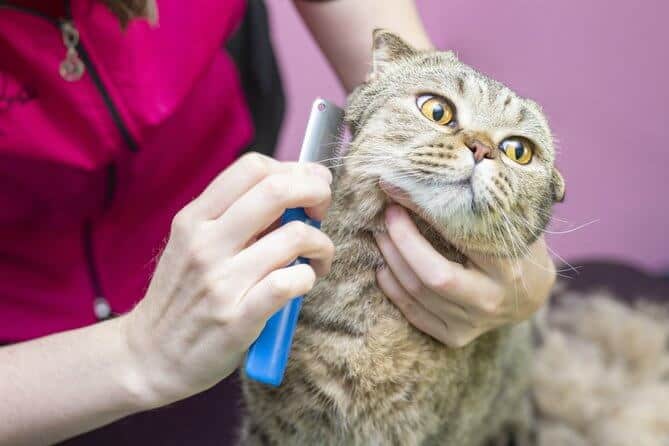
Brush Your Cat Regularly
For having enhanced dental health, you must brush your cat's teeth regularly. Although it can be a daunting task, start this habit early in your purr members' life, so they become accustomed to it.
Brushing aids in having a healthy gum eliminates bad odor and enhances the physical health of the cat. Besides, it also prevents periodontal diseases and reduces the accumulation and formation of tartar and plaque in your feline friend's mouth.
To do this, firstly make your cat feel comfortable and use a specially designed cat toothbrush. Let your cat taste the feline-friendly toothpaste and gentle motion, brush their teeth, gums, and give special attention to canines and upper molars.
It is highly recommended to use a cat-friendly moistened soft-bristle toothbrush and not a human brush for brushing your cat's teeth.
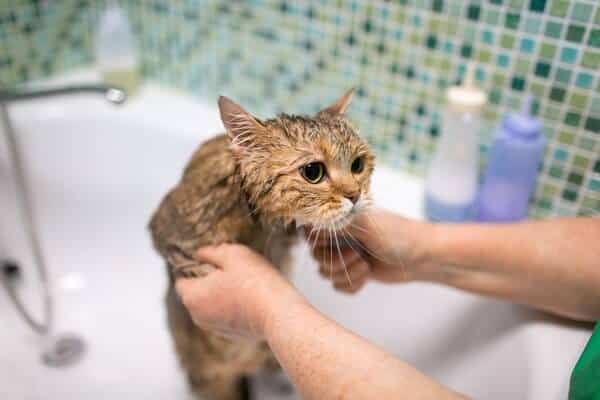
Bathe Your Cat
Cat owners have a common myth that they need not bathe cats regularly as cats can self-groom themselves. Contrary to this popular belief, your feline member requires bathing for maintaining a healthy lifestyle.
- Regular bathing removes the microbes accumulated in the fur that comes from the cat's saliva. It dries up and becomes airborne, posing a risk to both of you.
- The silky shining coat of your companion can become the hub of bacteria and dust if not cleaned regularly.
- Self-grooming becomes a tedious task for overweight cats, and their skin becomes flaky or itchy.
- Adult cats have greasier fur, and regular bathing helps to maintain the smoothness of the skin
- Bathing also aids in reducing hairballs and cat's fur shedding.
For bathing, use a pet-certified cat shampoo, towels, detachable shower, and treat your cat, so they are attracted towards the reward at the end of the bathing session. Prevent usage of a blow dryer.
Clipping Your Cat's Claws
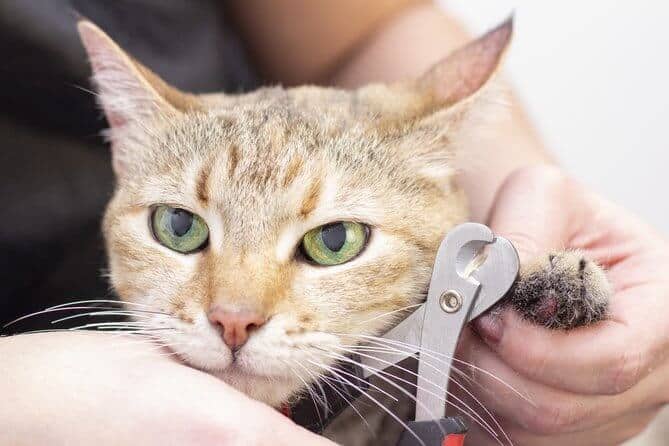
Belonging to the carnivores' family, cats sharpen their claws for climbing trees, marking their territory by scratching and hunting its prey. But this can be fatal for your furniture and leave scratch marks on your couches, tables, and sofas.
The occasional trimming of cat claws can help maintain cat health, especially if it's an outdoor cat as dust and dirt get accumulated in the claws. However, it is necessary to get your cat accustomed to the process by introducing a nail clipper if he/she is a kitten.
While cutting, avoid trimming the Quick area as it is sensitive, and only cut the white portion of the claw. Create a schedule of every ten days to clip the cat claws, but don't raise your voice if it resists.
We recommend you to take a slow approach and not trim all the claws at once. Besides, the declawing of cat claws is strictly prohibited.
Your cat health
From the moment your purring companion steps in the house, it is now your responsibility to look for its well-being. Besides, bringing in all the adequate equipment to make your home cat-friendly, don't forget to set up a meeting with a vet as early as possible.
Even when your cat is a kitten, vets can check and analyze their overall health. Furthermore, by offering your cat a balanced nutritious diet, regular grooming, and bathing session, you are laying the foundation of good cat health for a lifetime.
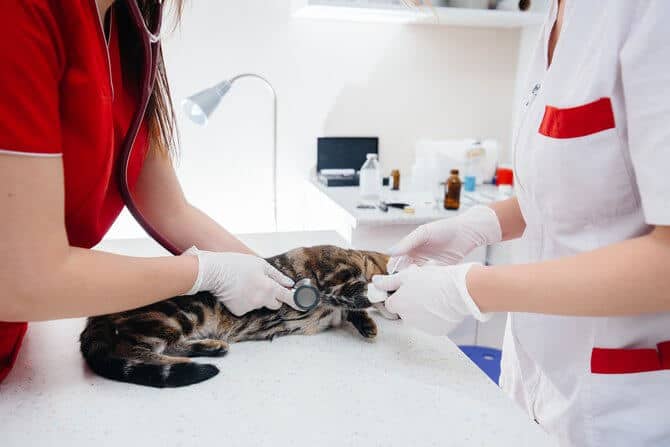
Find a Good Veterinarian
As a responsible cat owner, you are entitled to your fluffy friend's full responsibility, and it begins with finding the right vet and taking your cat for routine checkups. Your feline friend can master in disguising their pain and illness and portray themselves as a healthy cat. But cats, especially the older ones, suffer from health hazards like heart ailment, kidney malfunctioning, arthritis, hyperthyroidism, etc. Even dental disease is also a predominant illness. So, it is imperative to contact a certified vet with a good reputation, skilled diagnosis ability, and positive reviews.
While selecting a vet, kindly look for vets who can leverage solutions about your cat's particular ailment. We recommend keeping a list of 24 hours of emergency pet centers, in case your cat feels distressed in the middle of the night.
Vaccination
Every cat disease will have a separate dosage of vaccination at a specific age. If you have a kitten, the vaccination process starts from 6 to 8 weeks till they are 16 weeks old. The series of shots during this span is usually 3-4 times a week. However, adult cats require shots once a year or in 3 years, depending on the lifestyle and cat's health.
Some of the recommended vaccines for your feline friend are feline calicivirus, rabies, feline viral rhinotracheitis, feline distemper, feline leukemia, and bordetella. The cat vaccine's duration and frequency depend on pre-medical history and the cat's lifestyle—whether it is an indoor cat or outdoor.
Training & behavior
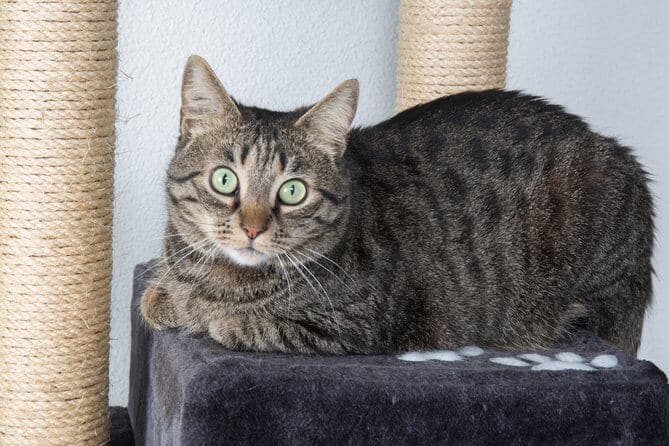
Cats are low maintenance self-independent animals that don't respond much to personal training like dogs. However, as a cat owner, you can continuously interact and instill some good habits.
Cat training is essential to enhance a cat's healthy physical health, protect it from other animals, or potential threats, and strengthen the bond between the pet and the owner.
Besides, behavioral patterns in cats vary according to their breed. While some are active, curious, and highly volatile, others can be self-absorbed, stable, and social. It is thus recommended to bring a cat that can be domesticated easily.
Kitten training basics
Cats are highly intelligent and can be trained to follow the orders of the pet owner. So start training your feline friend right from when it is a kitten.
- Start socialization: Start interacting with your kitten from an early stage for at least 10 minutes a day. Be patient as cats can't be forced into liking the owner. Proper socialization builds the foundation of an active cat.
- Train the feline to handle cat toys: Playing with cat toys is an excellent way to bond with your feline friend. Train the kitten to play with their toys instead of your hand because as they start growing, their scratches and bites will hurt you.
- Use positive reinforcement and encourage good gestures: Prepare small rewards to entice the cat into repeating the good behavior, which you have trained. Punishing a cat can serve your initial purpose, but in the long term, the cat will become devious.
Check Also: Why Does My Cat Sleep On Me?
Training for specific tasks (toilet, litter, scratching post)
Whether you have a kitten or an older cat, it is necessary to train them to use the litter box and use a scratching post instead of scratching your expensive furniture. Training the kitten is, however, much more convenient than an adult cat.
Cats will have a specific time when they want to scratch. So, put the scratching post next to their bed to easily stretch after a nap and scratch.
As for the litter box training after every meal, place your cat on it so that they get used to the routine. Give your feline friend small treats after every usage and place it away from the food bowls in a secluded and silent place. It is advisable not to yell at the cats whenever there is an accidental mess up as this will stress them out and make the training process more difficult.
Frequently Asked Questions
Cats are one of the most excellent companions for humans. With their playful and joyous natures, they can make the home ambiance fun-filled and entertaining. But before bringing home your feline friend, it is imperative to make the abode cat-friendly and have all the necessary equipment handy. Now that you have decided to get a purr animal home, so let's look at some of the most frequent questions every cat owner asks!
Why do cats sleep so much?
Sleeping for long hours is an innate ability of the cat family. Even after spending long hours in your home, your furball is lazy and loves to sleep. They sleep to conserve energy and get recharged before their next hunting.
Although your purr friend is a domesticated animal having food in a food bowl served by you, yet it has the biological traits of hunting down prey like its wild ancestors. A newborn kitten will sleep for 24 hours, but gradually it reduces to 16 hours, while adult cats can sleep for 15-20 hours.
So while your feline is awake, make the best use of it and indulge in an interactive play session with cat toys and training to build your cat healthy and active.
Why does my cat bite me?
Cat's love to bite as it is popularly known as it isn't an uncommon phenomenon. Cats by nature are predators, and a large portion of exploring their surroundings includes clawing, pouncing, and biting. It is a playful and stimulating activity for felines to bite their owner, but it is imperative to control aggressive behavior.
Biting can be a form of sending a message to the owner. Although most owners get confused to understand cat signals, biting can mostly indicate the irritating petting that they aren't enjoying and would like you to stop!
Cats can also bite during a playful session due to their innate hunting trait. Any game that includes activities about paws and claws will entice them to bite. But as a cat owner, you must train your cat to restrict biting human fingers and toes.
How long does a cat live?
Cats have a longer life span of 15 to 20 depending on their lifestyle, physical health, and nutrition balanced diet. Indoor cats tend to have a longer span than outdoor ones. The latter is more susceptible to traumas and dog attacks and are prone to incurring fatal diseases like Feline Leukemia and Feline Immunodeficiency Virus. It is seen that neutered cats have a longer life span.
A cat life has six stages starting from a kitten, junior, prime, mature, senior, and geriatric. Ideally, you bring home a kitten so that you can spend a more extended span with them. Cats' life span also depends upon their regular grooming and wellness care, including the intake of proper vaccines.
Why do cats eat grass?
Isn't it surprising to see your purr friend belonging to the predator’s group, munching down the green grass? As amusing as it looks, grazing might indicate that your cat is suffering from dietary deficiency and requires a vitamin booster.
Cats also graze for the natural laxative purpose to regularize their bowel movements. However, broad grasses have laxative benefits, but short grasses can cause stomach upset. Overeating of grass can cause the cat to vomit, but in the process, it throws up the ingested parasites, bones, feathers, or fur and relieves the digestion process. However, it is advisable to keep the cats away from grasses treated with fertilizers and pesticides.
How to travel with a cat?
Cats aren't a travel-friendly pet, but if you plan on shifting or going on a trip with your cat, it is recommended to have a sturdy and durable cat carrier that will ease the transportation. If the trip is by road for a short duration of 6 hours, your feline friend can easily stay in the carrier. Still, for a journey with a longer duration, it is necessary to park the car and let the cat out of the carrier and give access to food and litter periodically.
But before that, it is essential to check with the rules and regulations of the hotels and the aviation industry and also pack all the essential items like an extra pack of food and medication, cat ID and collar, litter box, food and water bowls, and some of the cat's favorite toys. Also, before voyaging, consult a vet for apt guidance.
How often should I feed my cat?
Cats can be fed twice a day at a 12 hours interval. However, other factors that decide the feeding frequency are as follows:
Cat Age: The frequency of eating is more in kittens as you can feed them 3-4 times a day, but gradually that will reduce to 2 meals per day as they grow up. Adult cats don't require frequent small meals, so feeding them once or twice suffices.
Cat Activity Level: If your cat is active and playful, free-feeding is preferable. In the case of overweight cats, it is necessary to break down the food into frequent intervals and train them to be active and healthy.
Type Of Food: Dry food can be left open for 24 hours, and cats can have it as per their hunger requirements, while canned food formulates the mealtime of twice a day or more.
Conclusion
Feed, play, train, interact, and groom are the main mantras to having a healthy and active cat at home. Looking for its dietary requirements, giving it adequate training, and taking to regular vet sessions for checkups will elongate the life span of the cat. Well, how to get a cat to like you is still an unanswered mystery, but studies show that frequent interaction can help you create a bond with your feline friend. They are loving beings, independent, most active, and playful that can keep your home ambiance warm and joyous. They can be lazy, but it is their innate trait to sleep for long hours.
Lastly, it is best not to expect affection from the cat as it varies according to the cat breed. So, if you want to play with your cat, it is recommended to bring home a lap cat that will snuggle up to and rest in your arms!

